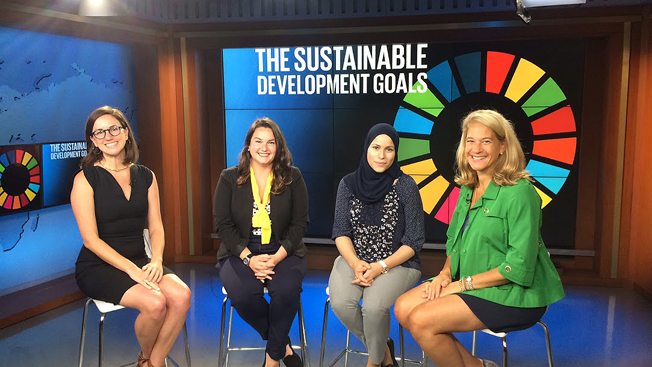It was October 1989 and Alaa’s mother had just gone into labour. Alaa’s father was in town, working, and couldn’t be reached. Her three-year-old sister had called the ambulance, but the medical crew couldn’t get there in time and so Alaa was born in her parents’ bedroom.
Had this story been happening in present-day Libya, where Alaa Murabit’s parents come from, it could’ve had a very grim ending. In 2015 alone, 303,000 women around the world died during pregnancy or childbirth. That same year saw close to six million children under the age of five perish. That’s over 800 mothers and 16,000 small children dying every day.
Alaa was lucky. She was born in Canada, a country with universal healthcare. “Within minutes I was in a hospital where they took my vitals and made sure I was OK,” she said.
She was even luckier to have supportive, open-minded parents who treated her and her brothers equally and who encouraged her career in medicine. “
Spurred on by her mother’s example, Alaa Murabit became a vocal activist for women’s rights and universal healthcare. Her initiatives, such as the groundbreaking “Noor Campaign”, which uses Islamic teaching to combat violence against women, are replicated internationally.
Last year, she became the youngest of the 17 Sustainable Development Goals Advocates – a group of eminent personalities who are helping the UN Secretary General to encourage action and commitments for the 2030 Agenda and its Sustainable Development Goals – the SDGs.
This week, Alaa Murabit is in New York for the High-Level Political Forum – an annual meeting to review progress made by countries towards achieving the SDGs. Her message to government officials and other stakeholders is as simple as it is strong: empower women to participate in sustainable development or fail.
“[Only when we] start having honest conversations about the impact that women and girls have on our communities and on this agenda, and the importance of our governments to resource that (…), that’s when we’re going to see legitimate change,” she told ministers and other high-level delegates on Monday.
In Tuesday’s SDGLive interview, she said it was understandable that countries focus more on some SDGs than others, depending on their priorities and capacities. But there are three goals, which according to her underpin the entire 2030 Agenda and where failure is simply not an option.
“The three areas we cannot overlook (…) are education, healthcare and gender equality. Those are the three areas that, when they intersect, can completely transform the world,” she said.
Alaa Murabit is convinced that the only path to achieve the SDGs leads through the economic and social empowerment of women and girls, and through ensuring that they have access to education.
“Data (…) backs up the fact that women and girls really are the key to seeing this agenda come to fruition,” she said in her SDGLive talk.
“If you talk about climate change action [for example], the most cost-effective and practical solution to climate change is the combination of girls’ education and women’s reproductive rights,” she added.
She quoted estimates, according to which equal education and employment opportunities for women and girls would result in a global economic growth greater than that of China and India combined. “We have to realize there is an untapped resource and the only way we can really leverage that is through education and through economic empowerment,” she said.
During the brutal conflict, which erupted in Libya at the beginning of this decade, Alaa called for women and local leaders to be allowed active participation in the peace process. In her new role of SDG Advocate, she remains a fervent champion of genuine women empowerment.
“We so often instrumentalize women,” she said. (…) “We very rarely empower and allow for women to be able to architect their own projects. And the one way, in which we can actually do that, is through economic empowerment, because we know that when women are economically empowered they re‑invest 90 per cent into their community. And the vast majority of that 90 per cent goes into health and education, so you’re completely transforming that landscape for future generations.”
But despite the wealth of data that supports empowerment and a broader participation of women in SDGs implementation, Alaa Murabit doesn’t see enough progress by countries in that field. “We need to start asking ourselves why, two years in we still haven’t really taken on this agenda as much as we can.”
To Alaa Murabit, the answer is simple: “Without women and girls, this agenda is not going to see the light of day – not even a little bit.”

